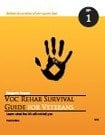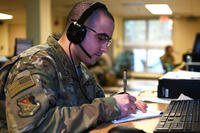Is the Decision Review Officer (DRO) your friend? Better put, is the Decision Review Officer like your priest, or your Veteran Service Officer, or your favorite buddy at the Legion?
No. In reality, it’s like saying the cops are your friends during your interrogation minus your Miranda Rights. Or, better yet, it’s like when the principal asked you about how you and your friends super glued the girls’ locker room shut while patting you assuredly on the back as though he’s your uncle - not your friend. No way, no how.
Those people are tools of a system and function that way for a reason. Decision Review Officers are employed to render a decision on your claim supplementing the appeals process. Now, we know cops and we know principals through experience. But what do we know about Decision Review Officers?
Here’s what the Decision Review Officer process is: it’s an option for veterans to have a second look at a decision from the VA about their claim. A veteran can either request a Decision Review Officer Review or a straight appeal to the Board of Veterans Appeals. After a DRO decision, you can still appeal to the Board.
The rest of this post is about problems with the Decision Review Officer (DRO) and their process, according the government. Now, I have my own take on DRO types, but that’s another story. For those who don’t know, the Government Accountability Office, the guys who report to Congress, recently released this report on DRO’s.
Here’s what the GAO found about Decision Review Officers and their process. I love the title, "Clearer Information for Veterans... Could Improve Appeal Process." That says it all:
- VA letters to veterans where the veteran chooses are not clear enough to help veterans understand the difference. According to Regional Office Managers, veterans could not make a clear choice just based on the letters.
- VA does not know how to effectively train Decision Review Officers. This would seem important to sort out since the DRO is supposed to make decisions. It would be nice if they were trained properly and in a uniform manner.
- VA does not know how to assign Decision Review Officers tasking. So in one office, the DRO may be doing informal hearings when they don’t have enough training. In another office, they may not.
To summarize, the VA has a tool, the Decision Review Officer role that could work well. However, the VA has not surprisingly no understanding how to use or how to train DRO’s to help them make DECISIONS.
Do during your hearing with the DRO, remember that the guy is not your friend. He is a person with a specific role and can make a decision on your claim. This decision can be made based on information you provide during the meeting. The DRO is possibly not trained well and possibly not being used properly.
Your take away. The DRO is not your friend. They are not trained properly. The government is aware of the problem. The VA is aware of the problem. Neither has fixed the problem.
Meanwhile, you are stuck plowing fields without a clue. Better pick a good plow. Your plow could be a Veteran Service Officer or an attorney. Make sure your plow is someone you know and trust. Never agree to anything straight out of the meeting unless you absolutely know what you’re doing.
I have a specific theory on these guys based on my own experience. I think there is some tomfoolery going on in the VA right now. If you want to read my unedited take on Decision Review Officers' thinking it’ll be posted on DisabledVeterans.org. But for now, just know that these professionals are not your friends.
# # # # #
 Benjamin Krause is an award winning investigative journalist, attorney, and disabled veteran of the US Air Force, where he served in its Special Operations Command. He wrote his guide, the Voc Rehab Survival Guide for Veterans, after winning his long fight for benefits against VA to help other veterans do the same. Benjamin is a graduate of Northwestern University and the University of Minnesota Law School using VA Vocational Rehabilitation.
Benjamin Krause is an award winning investigative journalist, attorney, and disabled veteran of the US Air Force, where he served in its Special Operations Command. He wrote his guide, the Voc Rehab Survival Guide for Veterans, after winning his long fight for benefits against VA to help other veterans do the same. Benjamin is a graduate of Northwestern University and the University of Minnesota Law School using VA Vocational Rehabilitation.



